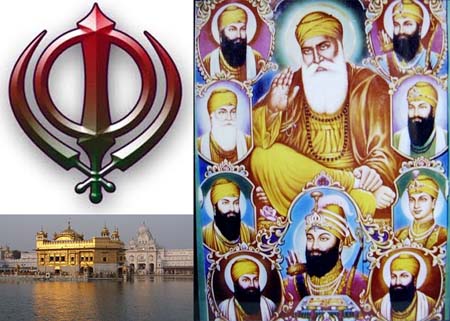
Symbol of Sikhism, Golden Gurdwara at Amritsar and all Sikh Gurus including Nanak the founder of Sikhism
What is Sikhism, and who was Guru Nanak
What is Sikhism? The main religion in the Punjab (of India), primarily due to a succession of 10 gurus starting with Guru Nanak, then Guru Angad Dev, Guru Amar Das, Guru Ram Das (creator of the Sikhs holiest city), Guru Arjan Dev, Guru Hargobind, Guru Har Rai, Guru Har Krishan, Guru Tegh Bahadur and Guru Gobind Singh (who created the army of God – Khalsa, which conquered and spread the teachings far & wide). Gobind Singh saw his end was near thus declared the Sikh bible as the next and last successor, hence its name, Guru Granth Sahib. “Under orders of the Immortal Being, the Panth was created. That’s what is Sikhism.
|
Name: |
Guru Nanak Dev; Sikh (disciple, a learner, and a seeker of truth) |
|
Birth, Age, Death: |
15 April 1469 – 22 September 1539 |
|
Nationality: |
Indian (present day Pakistan) |
|
Method/Religion started: |
Founder of Sikhism, 1st of 10 Sikh guru’s |
|
Holy book/teachings: |
Guru Granth Sahib, Dasam Granth |
|
Followers: |
25+ Million |
|
Lifestyle requirements: |
Simple life and pure vegetarian diet |
|
Form of practice: |
Prayer, meditation, devotional service & charity |
|
Wiki (encyclopedia) link: |
http://en.wikipedia.org/wiki/Sikhism |
The outer appearance of male Sikhs follow the 5 K’s, uncut hair (kesh ), a long knife (kirpan ), a comb (kangha), a steel bangle (kara ), and a special kind of breeches not reaching below the knee (kachha ). Male Sikhs take on the surname Singh (meaning lion), and women take the surname Kaur (princess). All made vows to purify their personal behaviour by avoiding intoxicants, including alcohol and tobacco and also keeping a strict pure vegetarian diet.
The ideals of the Sikh faith advises the devotee to meditate on God upon waking. Sikhs do prayer or meditation (reciting the holy name) or remembrance of the divine and is usually done while sitting comfortably, cross-legged, on the floor with eyes closed and in silence. Some Sikhs occasionally use steel prayer beads, called a mala to help with concentration or recite the name of God silently like a mantra.
Prayer may also take the form of devotional reading of the Granth Sahib which states “those mortals who consume marijuana, flesh and wine – no matter what pilgrimages, fasts and rituals they follow, they will all go to hell. ”
Guru Nanak, founder of Sikhism
Nanak was an extra-ordinary and different child in many ways, learning Hindi and Sanskrit when 7. He surprised all with his extra-ordinary knowledge about divinity. At 13, he learned Persian and Sanskrit and at 16, he was the most learned young man in the region. At 38, he heard God ‘s call to dedicate himself to the service of humanity after bathing in a small river. The very first sentence which he ‘ uttered then was, ” There is no Hindu, no Musalman“. He now undertook long travels to preach his unique and divine doctrine to be known as Sikhism.
What is Sikhism? Guru Nanak rejected the path of renunciation, the authority of the Vedas and the Hindu caste system. Instead he emphasised the leading of householder’s life, unattached to gross materialism. The selfless services of mankind, Kirtan, spiritual brotherhood and faith in ‘One’ Omnipotent God are the basic concepts of Sikhism established by Guru Nanak Sahib; the foundations of Sikhism. He preached new idea of God as Supreme, Universal, All-powerful and truthful. God is Formless, the Sole, the Creator, the self-existent, the Incomprehensible and the Ever-lasting and the creator of all things. God is infinite, All knowing, True, All-giver, and Omnipotent – the Eternal and Absolute Truth.
Most people would regard Guru Nanak as the most important of the legendary lineage, not just because he was the founder and due to his legacy; his unique Dharma.
